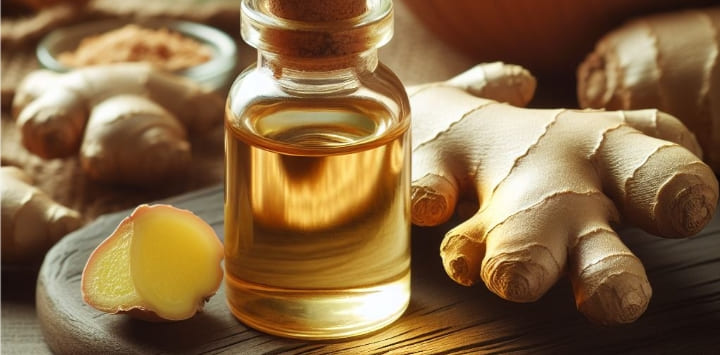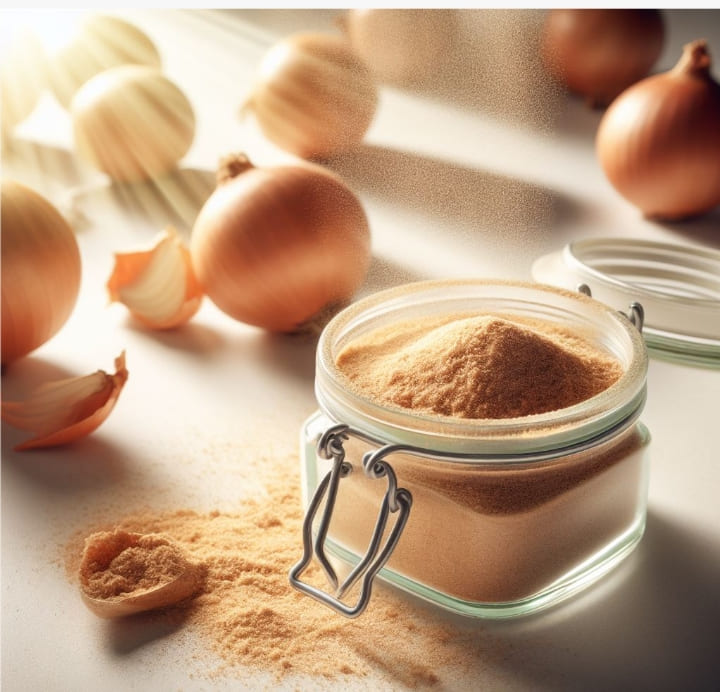
Ginger oil, derived from the root of the ginger plant, has been used for centuries for its medicinal and culinary properties. Ginger oil has a strong, warm, and spicy aroma that can be used for aromatherapy, skin care, hair care, and massage. It also has many health benefits due to its anti-inflammatory, anti-nausea, antioxidant, and other properties.
In this article, we will explore the top 12 powerful benefits of ginger oil, diving into the details of each benefit and providing tips on how to optimize them for maximum results.
What is Ginger Oil?
Ginger oil is a natural essential oil derived from the rhizome of the ginger plant, scientifically known as Zingiber officinale. It contains potent bioactive compounds, including gingerol, shogaol, and zingerone, which contribute to its medicinal properties.
Types of Ginger Oil
There are various types of ginger oil available, including:
- Steam-Distilled Ginger Oil: This is the most common type of ginger oil, obtained through the process of steam distillation. It retains the natural aroma and therapeutic properties of ginger. Benefits: Known for its anti-inflammatory and digestive properties. Aroma: Warm, earthy, and slightly sweet.
- CO2 Extracted Ginger Oil: This type of ginger oil is extracted using carbon dioxide, which helps preserve more of the volatile compounds present in ginger. Benefits: Preserves a broader spectrum of bioactive compounds, offering enhanced therapeutic benefits. Aroma: Potent, true to the natural scent of ginger.
- Cold-Pressed Ginger Oil: Cold-pressed ginger oil is obtained by pressing the ginger rhizomes without the application of heat. It is a more natural and unrefined form of ginger oil. Aroma: Mild, with a subtle hint of ginger. Benefits: Often used in culinary applications and mild topical applications.
Nutrition Profile of Ginger Oil
Here’s a breakdown of the nutritional content of ginger oil:
1. Gingerol:
- Function: Gingerol is the primary bioactive compound in ginger oil.
- Benefits: Known for its potent anti-inflammatory and antioxidant properties, gingerol is responsible for many of the health benefits associated with ginger oil.
2. Zingiberene:
- Function: Zingiberene is a sesquiterpene hydrocarbon found in ginger oil.
- Benefits: Contributes to the characteristic aroma of ginger oil and may have additional anti-inflammatory effects.
3. Beta-Bisabolene:
- Function: A natural sesquiterpene present in ginger oil.
- Benefits: Exhibits anti-inflammatory and antimicrobial properties, potentially contributing to the oil’s therapeutic effects.
4. Camphene:
- Function: Camphene is a bicyclic monoterpene found in ginger oil.
- Benefits: Adds a cooling sensation and may have mild analgesic (pain-relieving) effects.
5. Curcumin:
- Function: While not as abundant as in turmeric, ginger oil may contain trace amounts of curcumin.
- Benefits: Works synergistically with other compounds, offering additional anti-inflammatory and antioxidant benefits.
It’s essential to note that the nutritional content of ginger oil is highly concentrated, and the oil is typically used in small quantities for various purposes such as aromatherapy, massage, or culinary applications. While the nutritional profile may not mirror that of fresh ginger, the bioactive compounds retained in ginger oil contribute to its unique and valuable properties.
Now, let’s explore the incredible benefits of ginger oil and learn how to optimize each one for maximum effectiveness.
Ginger Oil Health Benefits

Here are the top 12 health benefits of ginger oil:
1. Improves Digestion
One of the most common uses of ginger oil is to improve digestion and relieve gastrointestinal issues such as indigestion, colic, diarrhea, spasms, stomachaches, and vomiting. Ginger oil contains gingerols, which are potent antioxidants and anti-inflammatory agents that can stimulate the production of digestive enzymes, increase the motility of the intestines, and relax the muscles of the digestive tract. Ginger oil can also help prevent or treat ulcers by inhibiting the growth of Helicobacter pylori bacteria, which are responsible for most cases of peptic ulcers.
To enjoy the digestive benefits of ginger oil, you can add a few drops to a glass of water or tea and drink it before or after meals. You can also massage a few drops diluted in a carrier oil such as coconut or almond oil on your abdomen in a circular motion to ease abdominal pain or cramps.
2. Relieves Nausea
Another well-known benefit of ginger oil is its ability to relieve nausea and vomiting caused by various factors such as motion sickness, pregnancy, chemotherapy, or surgery. Ginger oil works by acting on the serotonin receptors in the brain and stomach, which are involved in regulating nausea and vomiting. Ginger oil can also help reduce the severity and frequency of migraine headaches by inhibiting prostaglandins, which are inflammatory substances that trigger pain and inflammation in the blood vessels.
To use ginger oil for nausea, you can inhale it directly from the bottle or from a cotton ball soaked with a few drops. You can also diffuse it in your room or car using an aromatherapy diffuser or add a few drops to a warm bath or compress and apply it to your forehead or temples.
3. Supports Respiratory Health
Ginger oil can also support respiratory health by clearing congestion, soothing coughs, and fighting infections. Ginger oil has expectorant properties that can help loosen and expel mucus from the lungs and throat. It also has antibacterial and antiviral properties that can help prevent or treat respiratory infections such as colds, flu, bronchitis, or pneumonia. Ginger oil can also reduce inflammation and spasms in the airways, which can help relieve asthma symptoms.
To use ginger oil for respiratory issues, you can inhale it as described above or add a few drops to a bowl of hot water and inhale the steam. You can also rub a few drops diluted in a carrier oil on your chest, back, or throat to ease congestion and coughing.
4. Boosts Heart Health
Ginger oil can also boost heart health by lowering blood pressure, cholesterol, and blood sugar levels. Ginger oil can relax the blood vessels and improve blood circulation, which can help lower blood pressure and prevent hypertension. It can also inhibit the oxidation of low-density lipoprotein (LDL) cholesterol, which is the bad type of cholesterol that can cause plaque buildup and clog the arteries. Ginger oil can also modulate insulin secretion and sensitivity, which can help lower blood sugar levels and prevent diabetes complications.
To use ginger oil for heart health, you can take it internally as described above or massage it diluted in a carrier oil on your chest or feet. You can also add a few drops to your diffuser or bath to enjoy its relaxing effects.
5. Fights Infections
Ginger oil can also fight infections caused by bacteria, viruses, fungi, or parasites. Ginger oil has antimicrobial properties that can inhibit the growth and activity of various pathogens such as Escherichia coli, Staphylococcus aureus, Candida albicans, Aspergillus niger, or Leishmania donovani . Ginger oil can also enhance the immune system by stimulating the production of white blood cells and cytokines, which are substances that regulate inflammation and immunity.
To use ginger oil for infections, you can apply it diluted in a carrier oil on the affected area or add a few drops to a warm compress and apply it on the wound or infection. You can also take it internally as described above or gargle with it diluted in water to treat oral infections such as gingivitis or thrush.
6. Reduces Muscle Pain
Ginger oil can also reduce muscle pain and soreness caused by exercise, injury, or chronic conditions such as arthritis or fibromyalgia. Ginger oil has analgesic and anti-inflammatory properties that can block the transmission of pain signals and reduce the production of prostaglandins, which are inflammatory substances that cause pain and swelling. Ginger oil can also increase blood flow and oxygen delivery to the muscles, which can help speed up recovery and healing.
To use ginger oil for muscle pain, you can massage it diluted in a carrier oil on the painful area or add a few drops to a warm bath or compress and apply it on the sore muscles. You can also inhale it or diffuse it in your room to enjoy its soothing effects.
7. Improves Mood
Ginger oil can also improve mood and mental health by reducing stress, anxiety, depression, and fatigue. Ginger oil has antidepressant and anxiolytic properties that can modulate the levels of neurotransmitters such as serotonin, dopamine, and norepinephrine, which are involved in regulating mood and emotion. Ginger oil can also stimulate the central nervous system and increase alertness, focus, and memory.
To use ginger oil for mood improvement, you can inhale it or diffuse it in your room or office to create a positive and energizing atmosphere. You can also massage it diluted in a carrier oil on your temples, neck, or wrists to calm your nerves and uplift your spirits.
8. Enhances Libido
Ginger oil can also enhance libido and sexual performance by increasing blood flow, stimulating the senses, and balancing hormones. Ginger oil has aphrodisiac properties that can increase sexual desire and arousal by increasing blood flow to the genitals and enhancing sensitivity. Ginger oil can also stimulate the production of testosterone, which is the male sex hormone that affects libido, fertility, and sexual function. Ginger oil can also balance estrogen levels in women, which can affect libido, mood, and menstrual cycles.
To use ginger oil for libido enhancement, you can massage it diluted in a carrier oil on your lower abdomen or inner thighs or add a few drops to a warm bath or massage oil and enjoy with your partner. You can also inhale it or diffuse it in your bedroom to create a romantic and sensual ambiance.
9. Eases Menstrual Symptoms
Ginger oil can also ease menstrual symptoms such as cramps, bloating, mood swings, and headaches. Ginger oil has antispasmodic properties that can relax the uterine muscles and reduce menstrual cramps. It also has diuretic properties that can help reduce water retention and bloating. Ginger oil can also balance hormones and neurotransmitters that affect mood and emotion during menstruation.
To use ginger oil for menstrual symptoms, you can massage it diluted in a carrier oil on your lower abdomen or back or add a few drops to a warm compress and apply it on the painful area. You can also inhale it or diffuse it in your room to ease stress and tension.
10. Protects Against Radiation
Ginger oil can also protect against radiation damage caused by exposure to X-rays, gamma rays, or nuclear radiation. Ginger oil has radioprotective properties that can prevent or reduce oxidative stress, DNA damage, inflammation, and cell death caused by radiation exposure . Ginger oil can also enhance the antioxidant defense system of the body by increasing the levels of glutathione, catalase, superoxide dismutase, and other enzymes that scavenge free radicals.
To use ginger oil for radiation protection, you can take it internally as described above before or after exposure to radiation. You can also apply it diluted in a carrier oil on your skin or add a few drops to a lotion or cream and use it as a sunscreen.
11. Benefits of Ginger Oil for Hair

Ginger oil, a potent elixir for your strands, offers a myriad of benefits for hair health. Packed with antioxidants and essential nutrients, ginger oil stimulates hair follicles, promoting healthy and luscious locks. Its anti-inflammatory properties soothe the scalp, reducing dandruff and itching. Regular use of ginger oil can also strengthen hair, preventing breakage and split ends.
To harness these benefits, mix a few drops of ginger oil with a carrier oil like coconut or jojoba, and massage into your scalp. Leave it on for at least 30 minutes before washing. Alternatively, add a drop to your shampoo for an invigorating hair wash.
12. Benefits of Ginger Oil for Skin
Ginger oil emerges as a skincare powerhouse, bestowing numerous benefits for radiant and healthy skin. Its antioxidant properties combat free radicals, reducing signs of aging like wrinkles and fine lines.
The anti-inflammatory nature of ginger oil soothes irritated skin, providing relief from conditions like eczema or psoriasis. Additionally, it enhances skin elasticity and promotes an even skin tone.
To reap these rewards, dilute a few drops of ginger oil with a carrier oil such as sweet almond or olive oil, and apply it to your face. Gently massage in circular motions for improved absorption.
Alternatively, add a drop to your daily moisturizer for an extra boost. Embrace the natural goodness of ginger oil to nurture your skin, revealing a youthful and radiant complexion.
Potential Side Effects or Risks
While ginger oil offers numerous benefits, it’s essential to be aware of potential side effects and risks. Some individuals may experience skin irritation or allergic reactions when using ginger oil topically. It’s advisable to perform a patch test before applying ginger oil to a larger area. Furthermore, pregnant or breastfeeding women, as well as individuals with certain medical conditions, should consult a healthcare professional before using ginger oil.
Conclusion
Ginger oil is a versatile and potent natural remedy with a wide range of benefits for our health and well-being. From aiding digestion to promoting respiratory health and relieving pain, ginger oil has proven its effectiveness over centuries. By incorporating ginger oil into your daily routine and optimizing each benefit, you can harness the power of this incredible essential oil to enhance your overall wellness. Embrace the power of ginger oil and enjoy the remarkable benefits it has to offer.
FAQ
1. Is ginger oil safe to use during pregnancy?
Ginger oil should be used with caution during pregnancy. It’s best to consult with a healthcare professional before using ginger oil or any other essential oil during pregnancy.
2. Can I ingest ginger oil?
It’s generally not recommended to ingest ginger oil directly. Instead, consider using it in culinary preparations or as a flavoring agent in beverages.
3. What is the recommended dilution ratio for ginger oil?
A general guideline for diluting ginger oil is to use a 1-2% dilution, which means adding 5-10 drops of ginger oil per 1 ounce (30 ml) of carrier oil.
4. Can ginger oil be used for cooking?
Yes, ginger oil can be used in cooking. However, it is highly concentrated, so only a small amount is needed. It’s best to start with a drop or two and adjust according to taste.
5. Are there any drug interactions with ginger oil?
Ginger oil may interact with certain medications, such as blood thinners. If you are taking any medications, it’s advisable to consult with a healthcare professional before using ginger oil.
Related Posts
Learn more:
- Ginger Oil: Top 10 Benefits & How to Use It – Dr. Axe
- 11 Health Benefits of Ginger: Effect on Nausea, the Brain & More
- 10 Benefits and Uses of Ginger Oil | Nikura
Citations:
[1]https://www.ncbi.nlm.nih.gov/pmc/articles/PMC9460792/
[2]https://www.ncbi.nlm.nih.gov/pmc/articles/PMC9500894/
[3]https://www.ncbi.nlm.nih.gov/pmc/articles/PMC9412309/
[4] https://pubmed.ncbi.nlm.nih.gov/35802336/
[5] https://pubmed.ncbi.nlm.nih.gov/36342428/
































